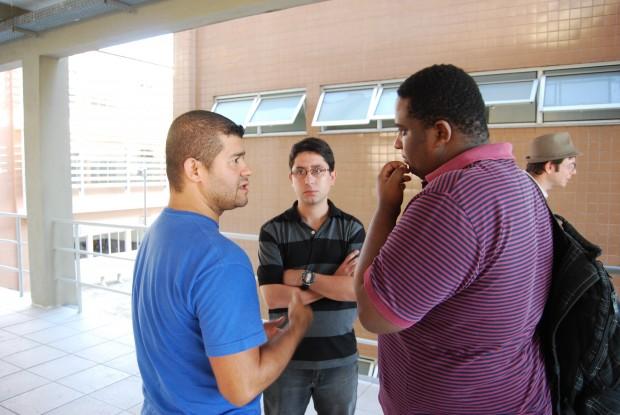Upward Mobility in Brazil and the Quest for Higher Education
Students at the Nova Iguacu campus near Rio reflect Brazil’s new policies to encourage more racial diversity at public universities. (Photo: Jason Margolis)
You don’t have to look hard to see signs of Brazil’s prosperity reaching the lower classes. When I visited some slums in Rio de Janiero, many of the modest houses and shacks had small satellite dishes on top, one tell-tale sign of people flirting with a middle class lifestyle.
That measure is a bit simplistic though.
“First of all, you have to be very careful with this idea that there more people in the middle class,” said Eduardo Siqueira of the Transnational Brazilian Project at the University of Massachusetts, Boston. He said these small signs of prosperity don’t tell the whole story in Brazil.
“The number of people who are poor, who got a little bit more money, does not mean that they became all of a sudden middle class, unless you classify middle class only by what they can purchase.”
Brazil is commonly referred to as an “emerging economy,” along with countries like China and India. But to get past that hurdle, Siquera said a better metric of middle class growth is: Can deserving kids go to college? For the vast majority of Brazilians, the answer remains no.
“Because the price of education increased much more than what they are able to afford,” said Siquera. “Most of the schools in Brazil are private, and many of the private schools are not good.”
Public universities are generally considered far superior to private schools in Brazil, with some exceptions. They’re also largely tuition free. But it’s hard to get a spot in these schools. Brazil ranks very low in the percentage of youths going to college compared with other big Latin American countries like Argentina and Mexico.
Brazilian policymakers are trying to rectify this. In the past decade, more than 600 new public campuses – both colleges and technical schools – have opened throughout the country.
Alexandre Fortes showed me around the Rio State Rural Federal University campus in Nova Iguacu, which was built from 2006 to 2010. He’s the dean of this campus, about an hour’s drive northwest of Rio.
This new school isn’t your bucolic campus with kids playing Frisbee on a lawn. The buildings are fenced in and have armed guards at the front post. This has long been a dangerous place.
“The number of people killed by gun fire, for example, in early 80’s or the mid-80’s, would be higher than most war zones around the world, mostly because of death squads that would patrol the poor areas and kill whoever they wanted,” said Fortes.
It’s safer today, although still considered quite dangerous. Fortes said he takes necessary precautions to avoid roads and areas that have had recent troubles.
Putting up campuses in poor areas is one pillar of Brazil’s attempt to diversify its student population. Affirmative action is another.
In 2001, some prestigious universities began setting aside 40 percent of spots for “Afro descendants.” Like in the US, where a Supreme Court decision on the matter is expected any day now, affirmative action has been controversial in Brazil.
Many argue it’s hard to determine who exactly is black, and what is black enough? Some say the system is too easy to game. To address this, university admissions are now subject to both racial quotas and household income levels. Last year, affirmative action became the law of the land at public universities in Brazil.
Alexandre Fortes said it has opened an important public debate about race, “to overcome this traditional myth that we don’t have racial discrimination or racial exclusion in Brazil.”
The students at Nova Iguacu are a mix of white, brown, and black, as is Brazilian society. Guilherme Santos Cabralde Oliveira is a dark-skinned son of a single mother.
“All my family is of the working class. Nobody goes to college,” he said.
Oliveira was engaging and excited to talk about his studies. He switched between English and Portuguese.
Speaking through an interpreter, he said a good public university in the area not only allows local kids like him to get an education, but also reach a higher social class.
He wants to be a teacher when he graduates.
I also met Bruno Souza Santos who grew up in a nearby favela. Speaking in Portuguese, he said most of his friends didn’t come here. Many got caught up dealing drugs, and some are dead.
I asked what his friends think of him going to college.
He said they see it as a way to escape the drugs, and they hope he ‘becomes somebody’ and gives back to the community. He’s aware that he’s one of the lucky few to get out.
The country’s progress in the past 10 years does bode well though for other success stories, said José dos Santo Souza, a sociologist at Nova Igaucu.
Speaking Portuguese, he said expanding the university system is an on-going work in progress. And he believes within 10 years, Brazil will be able to fulfill the demand.
If that does indeed happen, the day may not be far off when Brazil can go from being called an “emerging economy,” to one that has already “emerged.”
Our coverage reaches millions each week, but only a small fraction of listeners contribute to sustain our program. We still need 224 more people to donate $100 or $10/monthly to unlock our $67,000 match. Will you help us get there today?
